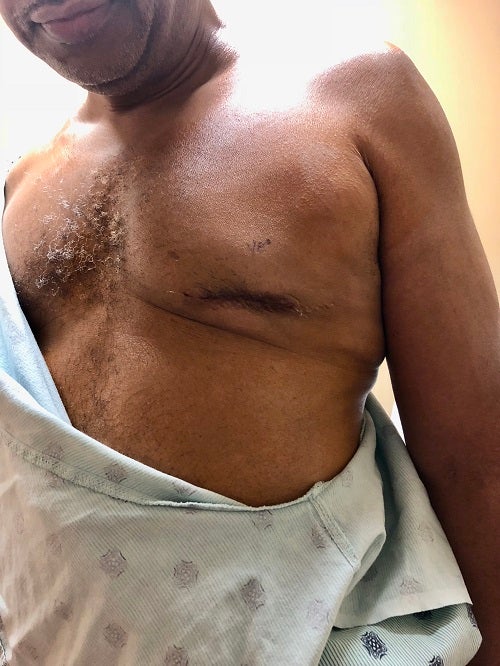He survived prostate cancer and breast cancer and is now sharing his message of survival
INDIANAPOLIS (WISH) – October is Breast Cancer Awareness month and a good reminder that, although rare, it is possible for men to get the disease.
“It’s a big shocker, you never really hear about men getting breast cancer a lot,” said breast cancer survivor Curt Jones, who is sharing his message of survival.
Jones has two adult children, a wife and works in logistics at Subaru of Indiana. He’s also an 11-year prostate cancer survivor who, having beaten it, enjoys traveling with his family.

But, underneath all of that, Jones also now has burn scars on his left breast from undergoing radiation after being diagnosed with breast cancer two years ago, joining the less than 1% of men diagnosed with breast cancer each year.

“There is a transition period where it’s like, ‘oh I have this,’” said Jones, who adds men need to stop acting tough when it comes to their health.
“You get older and your body needs your attention. Breast cancer… it doesn’t discriminate,” Jones said.
While the majority of breast cancer cases are found in women, survival rates for both genders are the same when comparing rates at each stage according to Dr. Erica Giblin, a breast surgeon with Ascension St. Vincent Hospital.
“The problem is men come in later because even if they find a lump, they might not know they even have breast tissue,” Dr. Giblin added.
She says a combination of factors like a lack of understanding of their breast anatomy and fear make survival rates in men drop.
In an ironic twist of fate, Dr. Giblin says Jones’ previous cancer diagnosis helped him survive breast cancer.
“Curt had prostate cancer, and he’s been undergoing surveillance for that, so when he and the physicians noted that lump, they took immediate action. Can you imagine the number of men who don’t? That’s a different outcome for men,” said Dr. Giblin.
Jones says at first it was embarrassing going in for his mammograms and watching the women’s reactions thinking he’s there for his wife.
“I’m used to it now. They know me, the technicians know me. I just say, ‘oh you got me this time,’” joked Jones.
Dr. Giblin adds Jones’ story is a teachable moment for women in the waiting room as well.
“They understand how this can affect their brothers, or husbands or men in their life, too,” said Dr. Giblin.
Jones continues taking a hormone-blocking pill once a day and says despite being in a high-risk group, the pandemic hasn’t slowed down his recovery and he continues treatment.
“I keep track of what I eat. Having a better lifestyle. And we pray. God wouldn’t put me in a situation that I couldn’t get through,” Jones adds.
But Dr. Giblin warns mammograms are down by up to 96% since the health crisis.
“Cancer doesn’t wait guys, get screened,” she adds.
For more information about male breast cancer symptoms and risk, click here.


